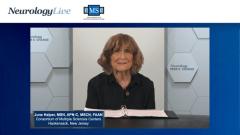
Identifying and Managing NMOSD
Types of testing that can help neurologists distinguish between acute attacks of neuromyelitis optica spectrum disorders (NMOSD) and multiple sclerosis, as well as therapies that can be used to help manage patients with NMOSD.
Episodes in this series

June Halper, MSN, APN-C, MSCN, FAAN: When I started working with MS [multiple sclerosis], it was called Devic’s. Then I met you, and you were correcting me immediately. Can you talk about how different the acute attack is from MS and how the treatments, in the past few years, have changed. Can you give us an overview of what an acute attack is and what we have in our toolbox to try to treat this disease?
Brian G. Weinshenker, MD: Like MS, this condition occurs in sudden attacks. There are symptoms that develop over hours but more typically over days or even a week or so. The evolution can vary depending on how severe the attack is. But what’s different from MS is these attacks tend to be more severe. Having said that, there’s a lot of variation. Occasionally, attacks may not be that severe, and sometimes MS attacks are severe. That alone doesn’t distinguish them.
MRI findings can be very helpful. For example, in the case of a myelitis—a spinal cord attack that causes numbness and weakness—with neuromyelitis optica [NMO], we typically see a very long central spinal cord lesion on the MRI, right down the center of the spinal cord, extending over 3 or more vertebral bodies. For the bones that surround the spine, we use them as a measure of how long the spinal cord lesion is. When we see 3 or more of those vertebral segments or longer lesions within the spinal cord, that makes us very suspicious of neuromyelitis optical. Now that we have this antibody, we call it NMO spectrum disorder because it’s got more symptoms than we previously recognized as Devic’s disease.
The most common and important syndrome is probably the 1 Doug experienced. That occurs in 1 in 5 patients with NMO spectrum disorder. It’s nausea, vomiting, and often hiccups that come on out of the blue. There are no other symptoms of abdominal pain or any other indication of stomach flu. This can persist for days, weeks, or months, and patients can lose a lot of weight. Often, they’ll see a gastroenterologist.
There are many ways that neuromyelitis optica can come to the attention of the medical system. It’s important for us to educate gastroenterologists that if you have a patient who has these symptoms, and you can’t find any other explanation, think about ordering this antibody test. Yes, the symptoms do overlap with MS but with more severe, distinct MRI findings. How do we manage the acute symptoms? It’s very similar to what we do with multiple sclerosis. We usually treat with steroids, high-dose intravenous.
One very helpful treatment, and I’ve played some role in determining that this was an effective treatment, is plasma exchange, which can be used not only in neuromyelitis optica but also for severe MS attacks. When the steroids don’t work, which unfortunately does occur in a minority of patients, treating with plasma exchange is a procedure in which the patient’s blood is circulated through a machine: centrifuged and divided into the liquid portion that contains antibodies and other inflammatory mediators and their cells. Their cells are returned to them, but we take away the liquid portion of the blood and replace it with an artificial plasma. It’s a very safe procedure. It can’t be done in every hospital, but in most significant-size medical centers this procedure is available. It’s a safe procedure. That has helped a number of people who may not have recovered with steroids alone. Half the patients with very severe attacks who failed steroids will get dramatically better after plasma exchange.
June Halper, MSN, APN-C, MSCN, FAAN: Thank you for watching Neurology Live® Cure Connections®. If you enjoyed this program, please subscribe to our e-newsletter to receive upcoming programs and other great content in your in-box.
Transcript edited for clarity.
Newsletter
Keep your finger on the pulse of neurology—subscribe to NeurologyLive for expert interviews, new data, and breakthrough treatment updates.















